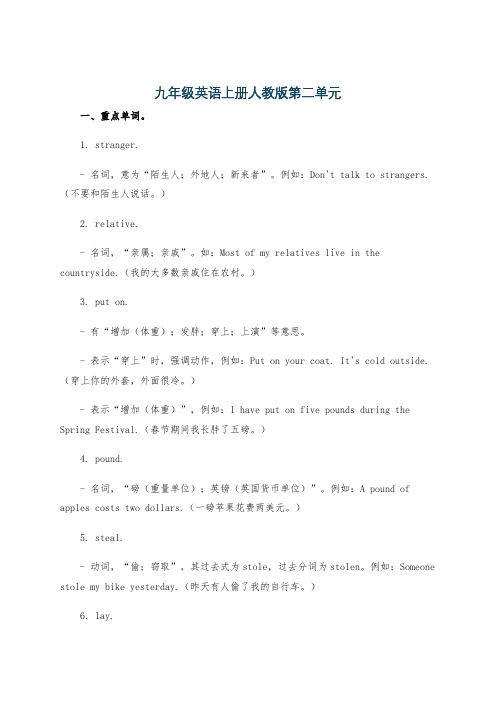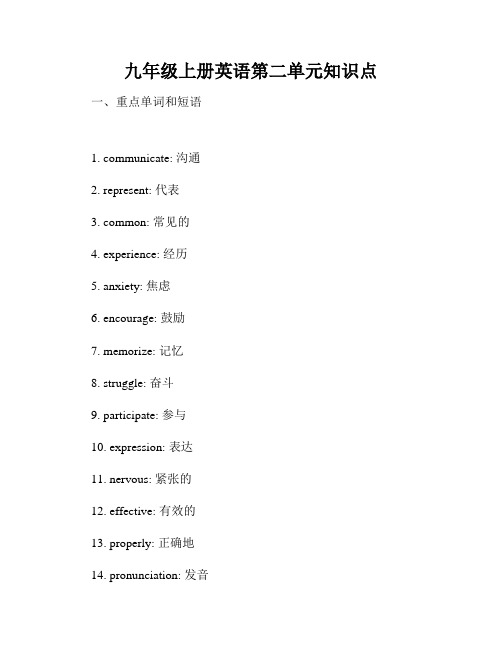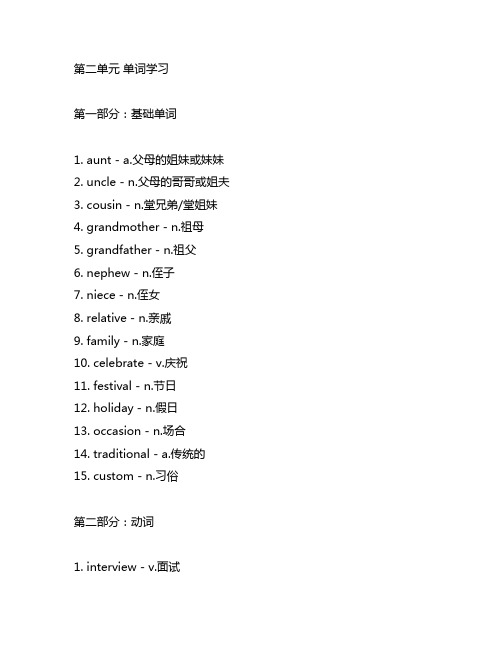九年级英语二单元
九年级英语上册人教版第二单元

九年级英语上册人教版第二单元一、重点单词。
1. stranger.- 名词,意为“陌生人;外地人;新来者”。
例如:Don't talk to strangers.(不要和陌生人说话。
)2. relative.- 名词,“亲属;亲戚”。
如:Most of my relatives live in the countryside.(我的大多数亲戚住在农村。
)3. put on.- 有“增加(体重);发胖;穿上;上演”等意思。
- 表示“穿上”时,强调动作,例如:Put on your coat. It's cold outside.(穿上你的外套,外面很冷。
)- 表示“增加(体重)”,例如:I have put on five pounds during the Spring Festival.(春节期间我长胖了五磅。
)4. pound.- 名词,“磅(重量单位);英镑(英国货币单位)”。
例如:A pound of apples costs two dollars.(一磅苹果花费两美元。
)5. steal.- 动词,“偷;窃取”,其过去式为stole,过去分词为stolen。
例如:Someone stole my bike yesterday.(昨天有人偷了我的自行车。
)6. lay.- 动词,“放置;安放;产(卵);下(蛋)”,其过去式为laid,过去分词为laid。
例如:The hen lays an egg every day.(这只母鸡每天下一个蛋。
)- 区别于lie(躺;位于),lie的过去式为lay,过去分词为lain。
7. dessert.- 名词,“(饭后)甜点;甜食”。
例如:Ice - cream is my favorite dessert.(冰淇淋是我最喜欢的甜点。
)8. garden.- 名词,“花园;园子”。
例如:There are many beautiful flowers in the garden.(花园里有许多美丽的花朵。
九年级上册英语第二单元知识点

九年级上册英语第二单元知识点一、重点单词和短语1. communicate: 沟通2. represent: 代表3. common: 常见的4. experience: 经历5. anxiety: 焦虑6. encourage: 鼓励7. memorize: 记忆8. struggle: 奋斗9. participate: 参与10. expression: 表达11. nervous: 紧张的12. effective: 有效的13. properly: 正确地14. pronunciation: 发音15. progress: 进步二、重点语法1. 一般现在时:表示经常性、习惯性的动作或事实。
例如:She always gets up early.2. 现在进行时:表示现在进行的动作。
例如:They are playing basketball now.3. 一般过去时:表示过去发生的动作或状态。
例如:I saw a movie yesterday.4. 过去进行时:表示过去某一时刻正在进行的动作。
例如:She was studying when I called her.5. 一般将来时:表示将来要发生的动作或事件。
例如:We will visit Beijing next month.三、重点句型1. How do you communicate with your friends?你是如何与你的朋友沟通的?2. I usually talk to them on social media.我通常在社交媒体上与他们交谈。
3. English is important for communication.英语对于沟通来说很重要。
4. I have some experience in learning English.我在学习英语方面有一些经验。
5. Don't be nervous and just enjoy the process.不要紧张,尽情享受这个过程。
九年级英语unit2知识点总结

九年级英语unit2知识点总结九年级英语Unit 2知识点总结Unit 2是九年级英语中的一单元,内容主要包括一些日常生活中的常用英语表达和语法知识。
在这个单元里,我们将学习如何描述人物、事物以及地点,并且掌握一些重要的语法规则,比如名词的用法、形容词和副词的比较级和最高级等。
一、描述人物在Unit 2中,我们学习了如何用英语来描述人物。
要描述一个人,我们可以用外貌特征、性格特点、兴趣爱好等方面的词汇来进行描绘。
例如:1. 外貌特征:He has short black hair and wears glasses.(他有短发,戴眼镜。
)She is tall and has blue eyes.(她个子高,眼睛是蓝色的。
)2. 性格特点:He is kind and helpful.(他很友善,乐于助人。
)She is shy but very smart.(她很害羞,但非常聪明。
)3. 兴趣爱好:He enjoys playing basketball in his free time.(他喜欢在空闲时间打篮球。
)She loves reading and writing stories.(她喜欢阅读和写故事。
)二、描述事物除了描述人物,我们还可以用英语来描述事物。
在Unit 2中,我们学习了如何用形容词来描述事物的特征、颜色和大小。
例如:1. 特征描述:The car is fast and comfortable.(这辆车开起来快速又舒适。
)The house is big and spacious.(这个房子很大、宽敞。
)2. 颜色描述:Her dress is blue and beautiful.(她的裙子是蓝色的,很漂亮。
)The flowers in the garden are red and vibrant.(花园里的花是红色的,很鲜艳。
)3. 大小描述:The laptop is small and lightweight.(这台笔记本电脑小巧轻便。
九年级全一册英语第二单元单词

第二单元单词学习第一部分:基础单词1. aunt - a.父母的姐妹或妹妹2. uncle - n.父母的哥哥或姐夫3. cousin - n.堂兄弟/堂姐妹4. grandmother - n.祖母5. grandfather - n.祖父6. nephew - n.侄子7. niece - n.侄女8. relative - n.亲戚9. family - n.家庭10. celebrate - v.庆祝11. festival - n.节日12. holiday - n.假日13. occasion - n.场合14. traditional - a.传统的15. custom - n.习俗第二部分:动词1. interview - v.面试2. prepare - v.准备3. assist - v.帮助4. share - v.共享5. invite - v.邀请6. decorate - v.装饰7. exchange - v.交换8. remember - v.记得9. celebrate - v.庆祝第三部分:形容词1. traditional - a.传统的2. annual - a.每年的3. festive - a.喜庆的4. modern - a.现代的5. special - a.特别的6. traditional - a.传统的7. colorful - a.多彩的8. joyful - a.快乐的9. exciting - a.刺激的第四部分:名词1. celebration - n.庆祝活动2. tradition - n.传统3. culture - n.文化4. festivity - n.庆祝活动5. ceremony - n.仪式6. reunion - n.团聚7. gift - n.礼物8. symbol - n.象征9. harmony - n.和谐第五部分:短语1. have a family party - 举办家庭聚会2. a big family dinner - 大家庭晚宴3. give and receive gifts - 送礼物和接受礼物4. wear traditional clothes - 穿传统服饰第六部分:句子1. My aunt and uncle areing to visit us this weekend. - 这个周末,我舅舅和阿姨要来看我们。
九年级英语第二单元单词

人教版九年级英语第二单元单词一、单词表1.mooncake /ˈmuːnkeɪk/ 月饼-解析:由moon(月亮)和cake(蛋糕)组成,表示与月亮有关的糕点。
-例句:We eat mooncakes on Mid-Autumn Festival.(我们在中秋节吃月饼。
)ntern /ˈlæntən/ 灯笼-解析:一种照明工具,通常在节日等场合使用。
-例句:There are many beautiful lanterns in the park.(公园里有很多漂亮的灯笼。
)3.stranger /ˈstreɪndʒə(r)/ 陌生人-解析:不认识的人。
-例句:Don't talk to strangers.(不要和陌生人说话。
)4.relative /ˈrelətɪv/ 亲属;亲戚-解析:和自己有血缘或婚姻关系的人。
-例句:We visit our relatives during the holidays.(我们在假期拜访亲戚。
)5.put on 增加(体重);发胖-解析:表示体重的增加,也可用于描述穿上衣服等动作。
-例句:She has put on some weight.(她长胖了一些。
)6.pound /paʊnd/ 磅(重量单位);英镑(英国货币单位)-解析:重量单位或货币单位。
-例句:The package weighs five pounds.(这个包裹重五磅。
)7.folk /fəʊk/ 民间的;民俗的-解析:与民间传统、习俗有关。
-例句:Folk art is very popular in some areas.(民间艺术在一些地区很受欢迎。
)8.goddess /ˈɡɒdɪs/ 女神-解析:女性的神。
-例句:In Greek mythology, there are many goddesses.(在希腊神话中,有很多女神。
)9.whoever /huːˈevə(r)/ 无论谁;不管什么人-解析:引导让步状语从句,表示任何人。
九年级英语2单元知识点总结

九年级英语2单元知识点总结一、重点单词。
1. used to.- 用法:used to + 动词原形,表示过去常常做某事,暗指现在不做了。
例如:I used to play football every day after school, but now I'm too busy.(我过去放学后每天都踢足球,但现在我太忙了。
)- 否定形式:didn't use to或used not to。
例如:He didn't use to like reading. = He used not to like reading.(他过去不喜欢阅读。
)- 一般疑问句形式:e to...?或Used...to...? 例如:Did you use to be afraid of the dark? = Used you to be afraid of the dark?(你过去害怕黑暗吗?)2. dark.- 词性:形容词,意为“黑暗的;昏暗的”;名词,意为“黑暗;暗处”。
例如:It's too dark in this room.(这个房间太暗了。
);Cats can see clearlyin the dark.(猫在黑暗中能看得很清楚。
)3. spider.- 词性:名词,意为“蜘蛛”。
复数形式为spiders。
例如:There is a spider on the wall.(墙上有一只蜘蛛。
)4. insect.- 词性:名词,意为“昆虫”。
例如:Ants are very small insects.(蚂蚁是非常小的昆虫。
)5. terrify.- 词性:动词,意为“使害怕;使恐惧”。
常见搭配:terrify sb.例如:The loud noise terrified the baby.(巨大的噪音吓坏了婴儿。
)- 形容词形式:terrified(感到害怕的,用来形容人)和terrifying(令人害怕的,用来形容事物)。
九年级英语知识点第二单元
九年级英语知识点第二单元第二单元: 九年级英语知识点1. 时态与语态 (Tenses and Voice)在英语语法中,动词时态和语态的正确运用是非常重要的。
以下是九年级学生在第二单元应该了解的时态和语态知识点:1.1 一般现在时 (Simple Present Tense)一般现在时用于表示经常性或普遍性的动作、情况或习惯。
它的结构是“主语 + 动词原形”。
例句:- She plays the piano every day. (她每天弹钢琴。
)- They live in a big house. (他们住在一所大房子里。
)1.2 一般过去时 (Simple Past Tense)一般过去时用于表示过去某个时间发生的动作或状态。
它的结构是“主语 + 动词过去式”。
例句:- He studied English last night. (他昨晚学习了英语。
)- We went to the beach last summer. (去年夏天我们去海滩了。
)1.3 一般将来时 (Simple Future Tense)一般将来时用于表示将来发生的动作或情况。
它的结构是“主语 + will + 动词原形”。
例句:- I will visit my grandparents this weekend. (这个周末我会去看望我的祖父母。
)- They will have a party for their anniversary. (为了他们的周年纪念,他们将会举办一个聚会。
)1.4 现在进行时 (Present Continuous Tense)现在进行时用于表示现在正在进行的动作。
它的结构是“主语 + am/is/are + 动词的ing形式”。
例句:- She is studying for her exam at the moment. (她此刻正在为考试而学习。
)- They are playing soccer in the park. (他们正在公园里踢足球。
人教版英语九年级全册Unit2单元教学设计
(二)过程与方法
1.采用任务型教学法,引导学生通过小组合作、讨论、调查等方式,探究环保问题,提高解决问题的能力。
2.利用多媒体课堂参与度。
3.设计丰富多样的课堂活动,如角色扮演、小组辩论、头脑风暴等,培养学生的创新思维和批判性思维。
-口语交流中,如何流畅使用所学句型和词汇,进行有深度的对话。
(二)教学设想
1.教学策略:
-采用情景教学法,通过图片、视频等直观教具,让学生在真实语境中感知和学习环保词汇和句型。
-利用任务驱动法,设计小组合作任务,让学生在完成具体任务的过程中,自然习得语言知识。
-实施差异化教学,针对不同学生的学习需求和能力水平,提供个性化的学习材料和指导。
3.强调环保的重要性,激发学生课后参与环保活动的热情。
4.布置课后作业,要求学生运用所学知识完成相关练习,为下一节课的学习做好准备。
五、作业布置
为了巩固本单元的学习成果,培养学生的自主学习能力,特布置以下作业:
1.词汇练习:要求学生复习本单元所学的环保主题词汇,并运用这些词汇完成课后练习册的相关练习。此外,鼓励学生通过查阅词典、网络资源等,自主扩展更多环保词汇,为课堂讨论和写作积累素材。
-组织学生进行环保主题的研究性学习,提高学生的探究能力和批判性思维能力。
四、教学内容与过程
(一)导入新课
在导入环节,我将采用以下方法激发学生的兴趣和好奇心,为学习新课做好准备:
1.展示地球生态环境的图片,让学生观察并思考:“What do you see in these pictures? How do you feel about them?”通过这种方式,让学生意识到环保问题的紧迫性。
九年级上册英语第二单元知识点梳理
九年级上册英语第二单元知识点梳理1. 词汇本单元主要涉及以下词汇:- appliance - 家用电器- behavior - 行为- daily routine - 日常事务- electronic device - 电子设备- etiquette - 礼仪- household chores - 家务事- manage - 管理- responsibility - 责任- schedule - 日程安排- task - 任务2. 语法本单元涉及以下语法知识:- 现在进行时:用于描述正在进行的动作或状态。
- 句型结构:主语 + am/is/are + 动词 + -ing。
例如:- I am watching a movie now.- She is studying for the test.- They are playing football in the park.3. 口语表达在本单元中,我们研究了一些日常生活中的口语表达。
- How do you manage your time? - 你是如何管理时间的?- What are your daily responsibilities? - 你的日常责任是什么?- Can you help me with this task? - 你能帮我做这个任务吗?- I need to do my household chores. - 我需要做家务事。
- It's important to have good etiquette. - 有良好的礼仪很重要。
4. 情景对话本单元涉及以下情景对话:1. 在朋友家拜访的对话2. 家庭成员分担家务的对话3. 大家分享日常事务的对话4. 讨论日程安排的对话通过这些情景对话,我们可以研究如何运用所学的语言知识来进行实际交流。
以上是九年级上册英语第二单元的知识点梳理。
希望对你的学习有所帮助!。
九年级上册英语第二单元短语
九年级上册英语第二单元短语一、重点短语。
1. put on.- 增加(体重);发胖。
例如:I put on five pounds during the Spring Festival.(春节期间我长胖了五磅。
)- 穿上;戴上(强调动作)。
例如:Put on your coat. It's cold outside.(穿上你的外套,外面很冷。
)2. be similar to.- 与……相似。
例如:My new dress is similar to yours.(我的新裙子和你的相似。
)3. throw...at...- 把……投向……;向……扔……(强调攻击性)。
例如:Don't throw stones at the dog.(不要向狗扔石头。
)- 区别:throw...to... 把……扔给……(强调传递性),如:Throw the ball to me.(把球扔给我。
)4. wash away.- 冲走;洗掉。
例如:The heavy rain washed away the soil.(大雨冲走了土壤。
)5. in the shape of.- 呈……的形状。
例如:The cake is in the shape of a heart.(这个蛋糕是心形的。
)6. shoot down.- 射下;击落。
例如:The hunter shot down a bird.(猎人射下了一只鸟。
)7. fly up to.- 飞向;飞往。
例如:The spaceship will fly up to the moon.(宇宙飞船将飞向月球。
)8. call out.- 大声呼喊;唤起。
例如:He called out for help.(他大声呼救。
)9. lay out.- 摆开;布置。
例如:She laid out the dishes on the table.(她把菜肴摆在桌子上。
- 1、下载文档前请自行甄别文档内容的完整性,平台不提供额外的编辑、内容补充、找答案等附加服务。
- 2、"仅部分预览"的文档,不可在线预览部分如存在完整性等问题,可反馈申请退款(可完整预览的文档不适用该条件!)。
- 3、如文档侵犯您的权益,请联系客服反馈,我们会尽快为您处理(人工客服工作时间:9:00-18:30)。
九年级二单元英语知识要点1.Chinese Spring Festival春节2. The Lantern Festival元宵节3.the Mid-Autumn Festival 中秋节4.The Water Festival 泼水节5.The Dragon Boat Festival端午节6. a little too crowded 有一点太拥挤be crowded with被。
挤满7. wonder v. 想知道8.wonder n. 惊奇,奇迹- wonderful adj.no wonder 难怪,怪不得the wonders of the world 世界奇观wonder about 想知道; 对…感到奇怪; 考虑wonder at 对…感到惊讶/奇怪in wonder 在惊奇中no wonder 难怪,怪不得with wonder 惊奇地the wonders of the world 世界奇观There was a look of wonder in his eyes.他眼中露出惊奇的神色。
They were filled with wonder at the new waterfall. 他们对新瀑布感到非常惊奇。
I wonder ..., I don't know ... 这两个短语都可译成“不知道”。
其区别是:I wonder ...作“不知道”解时, 其中含有“想知道”的意思; I don't know只是用来陈述对某事“不知道”这一事实。
例如:I wonder what you call this.不知道你们把这个叫做什么。
--- Do you know what they call this? 你知道他们把这个叫做什么吗?-- I don't know. 我不知道。
I wonder _____ he will come before 9:00 p.m..A. whatB. thatC. whenD. if9. I love the races.I think that they're fun to watchhave fun to do sthbe fun to do sth10. go for vacation去度假go on vacation 在度假11. put on five pounds 增加5磅put on穿上;上演;增加;What dress shall I put on for the meeting? 我穿什么衣服去开会?He didn't want to put on more weight.他不想增加体重。
The local drama group are putting on “Sister Jiang”at the Capital Theatre.当地的剧团正在首都剧场演出《江姐》。
你喜欢端午节的哪些方面?take off/ put off/ put down / put out/ put up with忍受,容忍/ put away12. 【自主归纳】短语put on有不同的含义, 其常见含义如下:13. in two weeks在这句话里的意思是“两周之后”。
He'll be back in two weeks.他两周后回来。
“in+ 一段时间”和将来时连用,表示“在某段时间之后”。
(2010 河北省卷) This term _______ over. The summer vacation is coming in two weeks.A. isB. wasC. has beenD. will be【解析】句义为“这学期即将结束,暑假在两星期之后就要到来。
”,故选择D。
“in+一段时间”和将来时连用,表示“在某段时间内”I will finish my homework in 2 hours.我两小时内做完了功课。
after +一段时间用于一般过去时14. . Sounds like fun. 听起来很有趣。
省略了it这个形式主语,完整的句子是:It sounds like fun.sound like 听起来像It sound like a nice room. Can we take a look at it?听起来房间不错,我们能看一看房间吗?Their love story sounds like a fairy tale. 他们的爱情故事听起来像童话。
感官动词+ likefeel like 摸起来像smell like 闻起来像look like 看起来像taste like 尝起来像15. be similar to 跟... 类似的; 与... 同样的同义词the same asbe similar to 的反义短语是be different from …(与……不同)16. throw water at each other 朝彼此泼水throw…at 朝。
仍/ throw.. to 扔给某人/throw away 扔掉Throw me that dictionary.把那本词典扔给我。
He threw the ball to another player.他把球传给另一个队员。
17. in the shape of以... 形状18. …is the most touching19. touching adj. 动人的;感人的/ touchedThis is the most touching story I have ever heard. 这是我听到过的最动人的故事。
We were deeply touched by their presents.我们被他们的礼物深深感动。
touch v. 触摸;感动;触及;接触Don't touch the paint until it's dry. 油漆未干, 切勿触摸。
His sad story touched our hearts.他的悲惨的故事深深打动了我们的心。
20. shoot down 击落,射下。
-shot shoot at 朝。
射击21. Whoever drank this could live forever, …whoever pron. 无论是谁;任何人。
Whoever wants the book may have it.谁想要这本书都可以拿。
I'll take whoever wants to go. 谁要去我就带谁去。
whoever= no matter who whatever=no matter what whenever=no matter when…..22. steal v. 偷;窃取/ stole- stolen steal…from….rob sb of sth抢走某人某物/ robbed23. 辨析:steal / rob从意思上讲steal表示偷窃的意思,而rob表示抢劫的意思;从搭配上来讲,steal sth. from sb. / sth. ; 而rob则用rob sb. / sth. of sth.。
例如:He stole money from the rich to give it to the poor.24. refuse to do sth 拒绝做某事light. n.光,日光,vt.使发光; 点燃; adj.轻的; 少量的,浅色的。
fly –flew- flown25. call out one’s name. 大叫某人的名字。
lay out 摆开;布置Don't lay out your clothes on the bed. Put them away. 别把你的衣服都摊在床上,把它们收起来26. lay v. 放置;=place 安放;产(卵);下(蛋) –laid-laidYou may lay it on the table.你可以把它放在桌子上。
You can't expect the hen to lay in the afternoon. 你不能期望鸡下午生蛋。
lie- lied-lied 说谎lie-lay-lain 躺下,位于;处于…27. lay, place, put, set这些动词均有“放”之意。
lay指小心地把人或物平放或横放,侧重动作安稳。
place较正式用词,指把某物放在一个正确的位置上,侧重动作的正确。
put普通用词,含义较广泛。
指把人或物置于某处,并将其留在该处。
set普通用词,指为了某种目的而将人或物放在一定位置上。
指物时多指立着放。
28. admire v. 欣赏;仰慕He was very successful in his business and all his friends admired him.他的事业非常成功,他的朋友都很羡慕。
admire sb/sth., admire sb. for sth.。
We admire (him for) what he has done. 我们对他所做的事很钦佩。
【2012 江苏无锡】—Jason is toostubborn sometimes.—I quite _______. But he's always friendly to others.A. acceptB. argueC. agreeD. admire 我很钦佩我父母亲。
29. dress up 打扮;穿上盛装Dress up 常与as, in 连用构成短语:dress up as… 意为“装扮/乔装打扮成…”dress up in… 意为“穿上…”后接表示衣服或颜色的名词。
►He likes to dress up as a soldier.他喜欢装扮成军人。
辨析:dress, wear, put on, have on 与be inDress “给某人穿衣服”,其宾语是人或反身代词,不是表示衣服等的名词Wear “穿着;戴着”强调状态Put on “穿上;戴着”强调动作Have on “穿着;戴着”强调状态。
不能用于被动语态。
Be in “穿着;戴着”强调状态,通常接表示颜色的名词。
30. treat n. 款待;招待she was cooking fish as a treat.她正在做鱼来款待客人。
This is my treat. 这次由我做东play a trick on 意为“捉弄”treat with sb跟某人商谈treat sb as 按…对待某人treat with sb 跟某人商谈as stubborn as mule 像牛一样倔强...短语treat sb with kindness 善意地对待某人treat sb with respect 对某人尊敬Treat sb with disregard 怠慢某人treat sb. to sth.对待某人某事。
